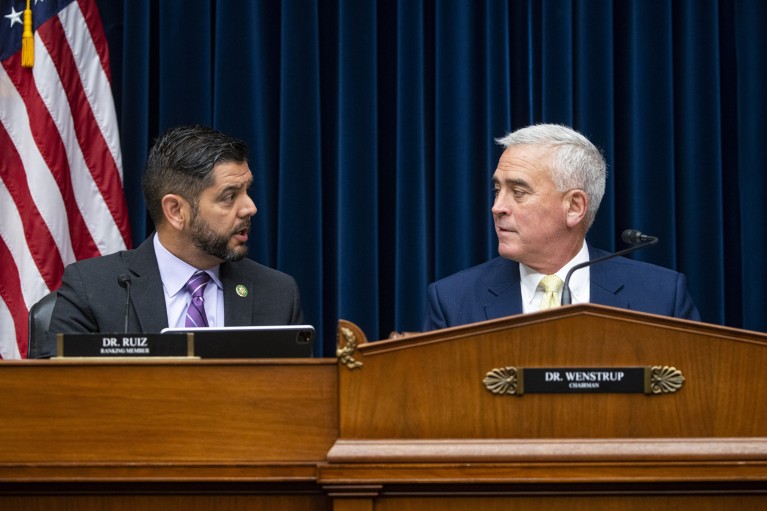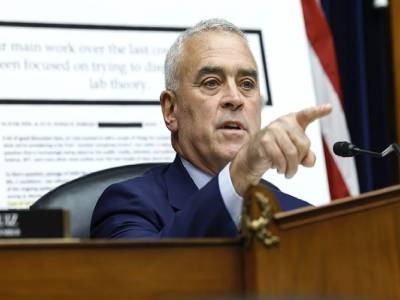[ad_1]

Brad Wenstrup (right), a Republican from Ohio who chairs the Select Subcommittee on the Coronavirus Pandemic, speaks with Raul Ruiz (left), a Democrat from California who is ranking member of the subcommittee.Credit: Al Drago/Bloomberg/Getty
During a public hearing in Washington DC today, Republicans in the US House of Representatives alleged that government scientists unduly influenced the editors of scientific journals and that, in turn, those publications stifled discourse about the origins of the COVID-19 pandemic. Democrats clapped back, lambasting their Republican colleagues for making such accusations without adequate evidence and for sowing distrust of science.
US congressional hearing produces heat but no light on COVID-origins debate
The session is the latest in a series of hearings held by the Select Subcommittee on the Coronavirus Pandemic to explore where the SARS-CoV-2 coronavirus came from, despite a lack of any new scientific evidence. Scientists have for some time been arguing over whether the virus spread naturally, from animals to people, or whether it leaked from a laboratory in Wuhan, China. Some have alleged that in the early days of the pandemic, government scientists Anthony Fauci, former director of the US National Institute of Allergy and Infectious Diseases, and Francis Collins, former director of the US National Institutes of Health (NIH), steered the scientific community, including journals, to dismiss the lab-leak hypothesis.
During the pandemic, “rather than journals being a wealth of information”, they instead “put a chilling effect on scientific research regarding the origins of COVID-19”, Brad Wenstrup, a Republican representative from Ohio who is chair of the subcommittee, said at the hearing. Raul Ruiz, a Democratic representative from California who is the ranking member of the subcommittee, shot back: “Congress should not be meddling in the peer-review process, and it should not be holding hearings to throw around baseless accusations.”
Holden Thorp, editor-in-chief of the Science family of journals in Washington DC, appeared before the committee to deny the suggestion that he had been coerced or censored by government scientists.
The subcommittee also invited Magdalena Skipper, Nature’s editor-in-chief, and Richard Horton, editor-in-chief of the medical journal The Lancet, to appear, but neither was present. Skipper was absent owing to scheduling conflicts, but a spokesperson for Springer Nature says the company is “committed to remaining engaged with the Subcommittee and to assisting in its inquiry”. (Nature’s news team is editorially independent of its journals team and of its publisher, Springer Nature.) The Lancet did not respond to requests for comment.
Academic influence?
This is not the first time that Republicans have accused members of the scientific community of colluding with Fauci and Collins. Evolutionary biologist Kristian Andersen and virologist Robert Garry appeared before the same subcommittee on 11 July last year to deny allegations that the officials prompted them to publish a commentary in Nature Medicine1 in March 2020 concluding that SARS-CoV-2 showed no signs of genetic engineering. They wrote in the journal that they did not “believe that any type of laboratory-based scenario is plausible” for the virus’s origins.

Holden Thorp became editor-in-chief of the Science family of journals in 2019.Credit: Steve Exum
Some lab-leak proponents have suggested, without evidence, that the pandemic began because the NIH funded risky coronavirus research at a lab in Wuhan, offering a motive for Collins and Fauci to promote a natural origin for COVID-19.
During the latest hearing, Republicans went a step further to suggest that not only did Collins and Fauci influence prominent biologists, but that they also encouraged journals to publish research supporting the natural-origin hypothesis. This accusation is based on e-mails that Wenstrup says the subcommittee obtained showing communication between top journal editors and government scientists. Thorp forcefully denied this line of questioning. “No government officials prompted or participated in the review or editing” of two key papers2,3 on COVID-19’s origins published in Science, he testified. “Any papers supporting the lab-origin theory would go through the very same processes” of peer review as any other paper, he said.
Thorp otherwise spent much of the 80-minute hearing answering questions about how a scientific manuscript is prepared for publication, what a preprint is and how peer review works. In a tense moment, Wenstrup questioned a social-media post on Thorp’s personal X (formerly Twitter) page, in which he downplayed the lab-leak hypothesis. Thorp called the post “flippant” and apologised.
Communication queries
Correspondence between journal editors and government scientists is to be expected, Deborah Ross, a Democratic representative from North Carolina, said at the hearing. “Government actors querying academia on issues that are academic in nature isn’t malpractice or unlawful — it’s just doing their jobs.”
Anita Desikan, a senior analyst at the Union of Concerned Scientists who is based in Washington DC and focuses on scientific integrity, tells Nature’s news team that it is customary for government agencies to reach out to stakeholders to inform policy decisions. Even if a government scientist suggests an idea for a journal paper, “that doesn’t mean it will be published or receive praise from the scientific community”.
Roger Pielke Jr, a science-policy researcher at the University of Colorado Boulder, who was originally slated to testify before the subcommittee until his invitation was rescinded owing to logistical reasons, disagrees. He thinks that Fauci and Collins still shaped the Nature Medicine COVID-19 origins paper by recommending that specific scientists investigate and by offering advice along the way. Nevertheless, the hearing was a “dud”, Pielke Jr says, because Thorp was the wrong witness. Instead, a more relevant witness would have been a government scientific-integrity officer who is more knowledgeable about what constitutes an ethical breach, he adds.
[ad_2]
Source Article Link


